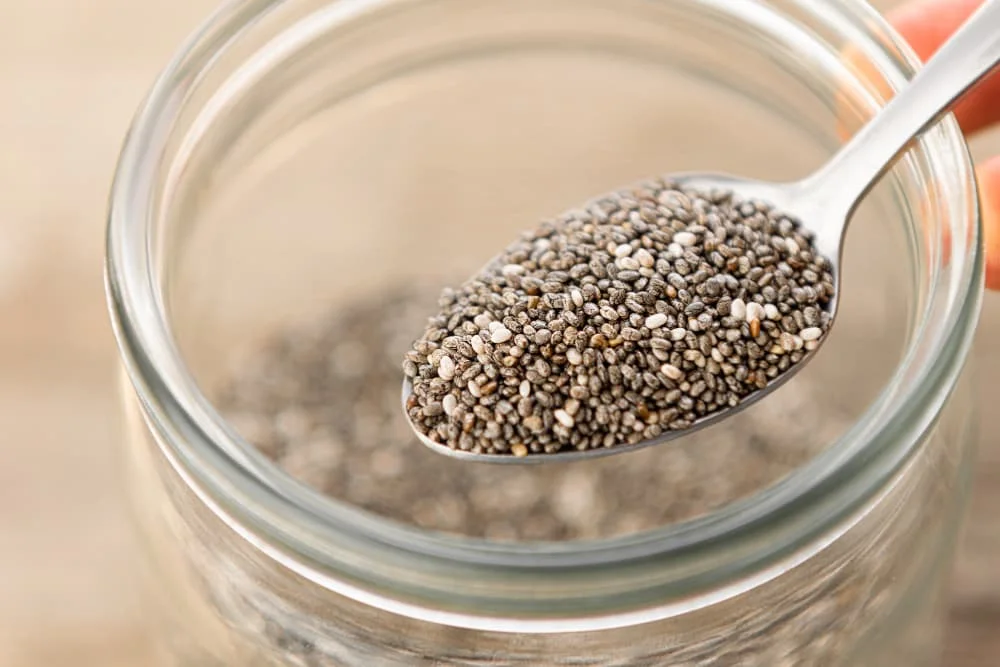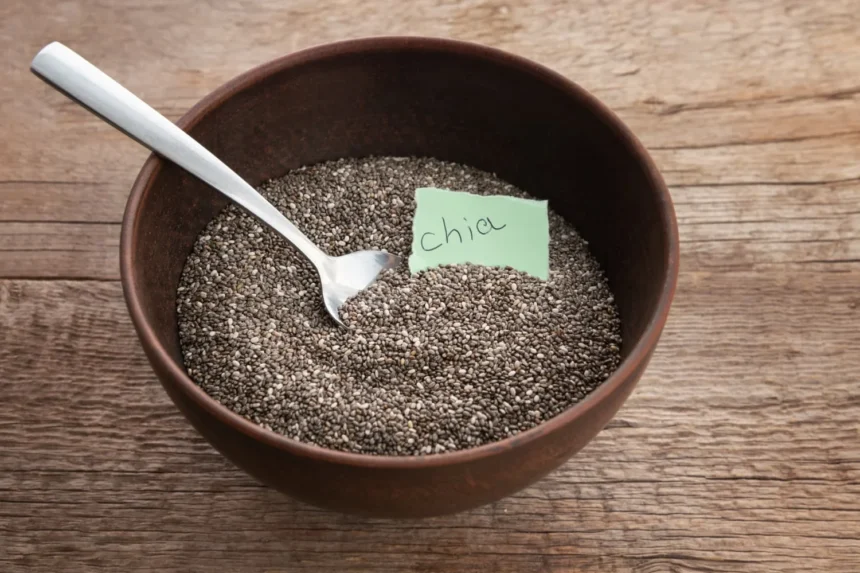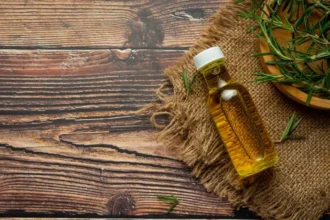Chia seeds have gained superfood status in recent years, and for good reason. This article explores their nutritional benefits, how to incorporate them into your diet, and any potential side effects. Whether you’re looking to boost your energy, support digestion, or improve overall wellness, these tiny seeds might be the key to a healthier lifestyle.
What Are Chia Seeds?
Chia seeds are small, oval-shaped seeds that come in black and white varieties. They originate from the Salvia hispanica plant, a member of the mint family native to Mexico and Guatemala.

🌱 A Superfood with Ancient Roots
✔️ Consumed by Aztecs and Mayans for sustained energy.
✔️ Historically valued for nutritional density and endurance benefits.
🌿 A Modern-Day Nutritional Powerhouse
Despite their small size, seeds are packed with essential nutrients:
✔ High in fiber – Supports digestion and gut health.
✔ Rich in omega-3 fatty acids – Beneficial for heart and brain function.
✔ Good plant-based protein source – Helps muscle repair and satiety.
✔ Loaded with essential minerals – Calcium, magnesium, and phosphorus.
Beyond their nutritional profile, chia is incredibly versatile. You can easily add them to smoothies, yogurt, oatmeal, and even baked goods to enhance both flavor and nutrition.

Chia Seeds Nutrition: A Closer Look at the Facts
Seeds may be small, but they are packed with essential nutrients that support digestion, heart health, and energy levels. Below, we break down their nutritional value and why they deserve a spot in your diet.
🔹 A tablespoon of chia seeds contains just 60 calories but is rich in fiber, protein, and omega-3s—making them a filling and energy-boosting snack.
🔹 Unlike processed snacks, chia provide long-lasting energy without blood sugar spikes.
| Nutrient | Amount per 12g | % Daily Value (DV) |
|---|---|---|
| Calories | 60 kcal | 3% |
| Protein | 3g | 6% |
| Fiber | 4g | 14% |
| Total Fat | 5g | 8% |
| Omega-3 Fatty Acids | 2.5g | N/A |
| Carbohydrates | 5g | 2% |
| Calcium | 76mg | 6% |
| Magnesium | 40mg | 10% |
| Phosphorus | 104mg | 8% |
| Manganese | 0.3mg | 13% |
| Zinc | 0.6mg | 5% |
| Potassium | 50mg | 1% |
Key Vitamins and Minerals
Chia seeds are an excellent source of essential micronutrients, including:
✔ B Vitamins (B1, B2, B3) – Help convert food into energy and support brain function.
✔ Iron – Supports oxygen transport and red blood cell production.
✔ Selenium – A powerful antioxidant that helps protect cells and supports thyroid function.
✔ Magnesium & Calcium – Essential for bone health and muscle function.
With their rich nutritional profile, seeds are a simple way to boost overall wellness and add natural energy to your daily routine.

7 Impressive Health Benefits of Chia Seeds
Despite their small size, chia seeds are packed with powerful nutrients that support digestion, heart health, weight management, and more. Let’s explore science-backed reasons why adding them to your diet can improve your overall well-being.
1. Supports Digestion with High Fiber Content
🌱 Chia is rich in fiber, aiding digestion by:
✔ Promoting regular bowel movements and preventing constipation.
✔ Acting as a prebiotic, feeding beneficial gut bacteria for better gut health.
A single serving provides a significant portion of your daily fiber needs, making them an excellent choice for digestive health.
2. Omega-3 Powerhouse for Heart Health
💖 Chia seeds are one of the best plant-based sources of omega-3 fatty acids, particularly alpha-linolenic acid (ALA). Omega-3s help:
✔ Reduce inflammation and support heart function.
✔ Maintain healthy cholesterol levels and blood pressure.
✔ Support overall cardiovascular well-being.
While ALA must be converted into EPA and DHA, studies show that even in its natural form, ALA contributes to heart health.
3. Helps Regulate Blood Sugar Levels
⚖️ Chia slow the absorption of sugar into the bloodstream, helping to:
✔ Prevent blood sugar spikes and crashes.
✔ Improve insulin sensitivity, making them beneficial for diabetes management.
✔ Provide steady energy levels throughout the day.
4. Antioxidant-Rich for Cellular Protection
🛡️ Packed with antioxidants like quercetin, kaempferol, and chlorogenic acid, chia seeds:
✔ Neutralize harmful free radicals, reducing oxidative stress.
✔ Help prevent premature aging and chronic diseases.
✔ Support overall immune function.
5. Aids in Weight Management
⚡ Seeds promote satiety, thanks to their fiber and protein content:
✔ Expand in liquid, helping you feel fuller for longer.
✔ Reduce cravings by balancing blood sugar levels.
✔ Support portion control and healthy eating habits.
While chia is not a magic weight loss food, incorporating them into a balanced diet can aid in appetite control and weight management.
6. Supports Strong Bones
🦴 Rich in essential minerals, chia to bone strength by providing:
✔ Calcium – Key for bone density and overall skeletal health.
✔ Magnesium & Phosphorus – Essential for bone formation and maintenance.
✔ Manganese – Supports bone metabolism and collagen production.
7. Natural Anti-Inflammatory Benefits
🔥 Chronic inflammation is linked to various diseases and aging. Seeds help combat inflammation by:
✔ Providing omega-3s, which help reduce inflammatory markers.
✔ Delivering antioxidants, protecting cells from damage and stress.
Why Should You Add Chia Seeds to Your Diet?
✨ Chia offer a simple way to boost overall health. Their high fiber, omega-3s, and essential minerals make them a nutrient-dense superfood with benefits ranging from better digestion to improved heart health.
🌿 Start small—add them to smoothies, yogurt, or oatmeal to reap their impressive health benefits!
How to Eat Chia Seeds: Practical Tips and Ideas
Chia is versatile, nutrient-rich, and easy to incorporate into any meal. Their mild taste allows them to blend seamlessly into both sweet and savory dishes without altering flavors. Whether you enjoy them raw, soaked, or mixed into recipes, these tiny seeds can boost your nutrition effortlessly.
1️⃣ Portion Size Matters
✅ Standard serving: 1-2 tablespoons per day.
✅ Start small: If you’re new to chia, begin with 1 tablespoon and gradually increase.
2️⃣ Should You Soak Chia Seeds?
You can consume seeds raw or soaked, but soaking them enhances their digestibility and nutrient absorption.
🔹 How to Soak Seeds: Mix 1-2 tablespoons of chia seeds with water, juice, or milk and let sit for 10-15 minutes until they develop a gel-like texture.
✅ Why Soak?
✔ Easier to digest – Helps release nutrients more effectively.
✔ Hydrating – The gel-like consistency aids in hydration.
✔ Better texture – Softens the seeds for smoother consumption.
When Should You Eat Chia Seeds? Morning or Night?
⏰ Morning:
✔ Boosts energy and digestion.
✔ Keeps you full longer, reducing cravings.
✔ Works well in breakfast bowls, smoothies, or water.
🌙 Night:
✔ Supports overnight digestion.
✔ Helps with muscle recovery (especially if paired with protein).
✔ Ideal for chia pudding as a late-night snack.
👉 Best time? Whenever it fits your routine!
Creative Ways to Add Chia to Your Diet
🌱 Chia seeds work in almost any meal! Try these simple ideas:
🥤 Smoothies: Blend in 1 tablespoon for added fiber and protein.
🍦 Yogurt: Sprinkle on top or mix in for extra texture.
🥗 Salads: Toss some in for a light, crunchy boost.
🥣 Oatmeal: Stir into warm oats for a nutrient-packed breakfast.
🍞 Baking: Add to muffins, bread, or cookies for a health boost.
🍮 Chia Pudding: Combine seeds with milk and a sweetener, refrigerate overnight, and top with fruits and nuts.
🍫 Energy Bites: Mix with oats, nuts, and honey for a quick, on-the-go snack.
2. Chia Seeds in Water: A Simple Hydration Boost
A quick and easy way to enjoy chia is by mixing them with water.
🥤 How to Make Chia Seed Water:
✔ Stir 1-2 tablespoons into 1 cup of water.
✔ Let it sit for 15-20 minutes until it thickens into a gel.
✔ Add a squeeze of lemon or lime for extra flavor.
💡 Benefits:
✔ Promotes fullness – The fiber expands, helping with satiety.
✔ Supports digestion – Helps regulate bowel movements.
✔ Keeps you hydrated – A refreshing, nutrient-packed drink.
1. Easy Chia Pudding Recipe 🥄
🥄 Ingredients:
✔ 1/4 cup chia seeds
✔ 1 cup milk (dairy or plant-based)
✔ 1 tsp maple syrup or honey
🥄 Instructions:
✔ Mix all ingredients in a jar.
✔ Refrigerate overnight.
✔ Stir and top with fruits, nuts, or coconut flakes before serving.
✨ A nutrient-rich breakfast or snack, ready to eat!
Potential Side Effects and Precautions
While chia seeds are generally safe and nutritious, it’s important to be aware of potential side effects and special precautions for certain individuals. Here’s what you need to know before adding them to your diet.
When Should You Avoid Chia?
1️⃣ Digestive Discomfort
⚠️ High in fiber, chia can cause:
✔ Bloating, gas, or diarrhea if consumed in excess.
✔ Discomfort if your body isn’t used to fiber-rich foods.
💡 How to prevent this?
✅ Start small – Begin with 1 tablespoon and gradually increase.
✅ Stay hydrated – Drink plenty of water to help digestion.
2️⃣ Allergic Reactions
⚠️ Although rare, some individuals may experience allergies, which can cause:
✔ Skin rashes, itching, swelling.
✔ Difficulty breathing (seek medical attention immediately).
💡 Tip: If you have a history of seed or nut allergies, introduce seeds cautiously.
3️⃣ Pregnancy & Breastfeeding
⚠️ Limited research exists on the safety of chia during pregnancy and breastfeeding. While they offer valuable nutrients, it’s best to:
✅ Consult your doctor before regular consumption.
4️⃣ Blood Thinners & Omega-3 Interaction
⚠️ Chia seeds contain omega-3 fatty acids, which may have a mild blood-thinning effect.
✅ Caution advised if you take warfarin or other blood-thinning medications.
✅ Speak with your healthcare provider before consuming regularly.
5️⃣ Low Blood Pressure Concerns
⚠️ Chia seeds may help lower blood pressure, which can be beneficial—but if you already have low blood pressure, they might cause dizziness or lightheadedness.
✅ If you take blood pressure medications, consult a doctor before adding them to your diet.
What Not to Mix with Chia Seeds?
🚫 1️⃣ Medications
✔ Blood thinners & blood pressure medications – Chia may enhance their effects, so speak to your doctor first.
🚫 2️⃣ Calcium Channel Blockers
✔ These heart medications can interact with seeds—check with your doctor if you’re taking them.
🚫 3️⃣ Excessive Intake of Other High-Fiber Seeds
✔ Eating too many chia, flax, or hemp seeds together can lead to digestive discomfort, as fiber intake may become excessive.
✔ Balance your fiber intake by spreading it throughout the day.
Key Takeaways
✅ Chia seeds are safe for most people when consumed in moderation.
✅ Start with small servings and increase gradually.
✅ Stay hydrated to prevent digestive discomfort.
✅ If you have health concerns or take medication, consult your doctor before making them a regular part of your diet.
⚠️ This information is for educational purposes only and should not replace professional medical advice. If you have concerns about chia and your health, talk to a healthcare professional.
Frequently Asked Questions (FAQs)
Can I eat chia seeds dry or do they need to be soaked?
You can enjoy them both ways. However, soaking is often preferred because it softens the seeds, making them easier to digest and enhancing nutrient absorption. When left in liquid, they develop a pleasant, gel-like texture that many find more enjoyable.
How should I store seeds?
For optimal freshness, keep them in an airtight container in a cool, dry, and dark place. Under these conditions, they can remain in good shape for up to two years.
Are chia seeds gluten-free?
Yes, they are naturally gluten-free, which makes them an excellent choice for individuals with celiac disease or gluten sensitivities.
Can chia seeds help with constipation?
Absolutely. Their high fiber content helps add bulk to your stool, promoting regular bowel movements and easing constipation.
What is the difference between black and white chia seeds?
Nutritionally, there is no significant difference between the two. Both varieties offer similar health benefits and share nearly identical nutrient profiles—the color variation is simply a natural genetic trait of the Salvia hispanica plant.
Can chia seeds help lower cholesterol?
Yes, studies suggest that the soluble fiber and omega-3 fatty acids found in chia seeds may help reduce LDL (“bad”) cholesterol levels, contributing to better heart health.






